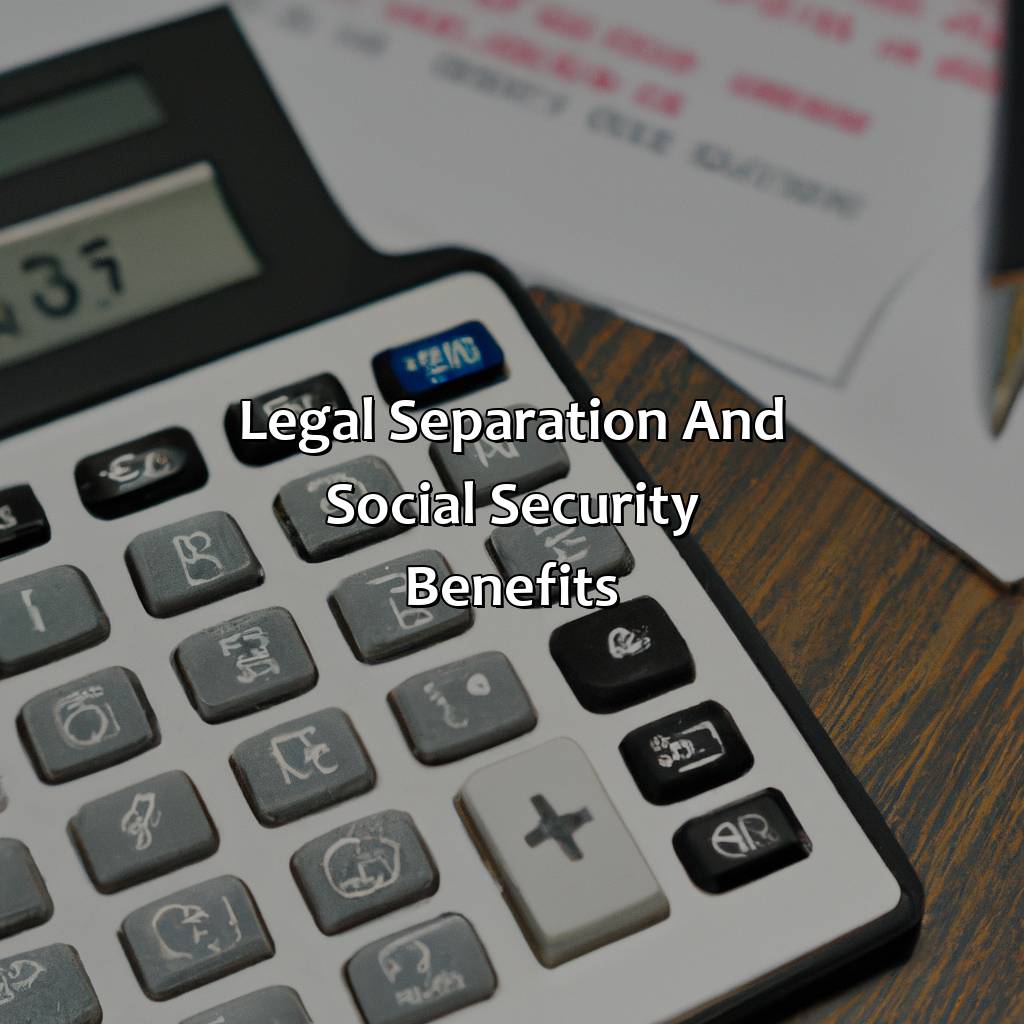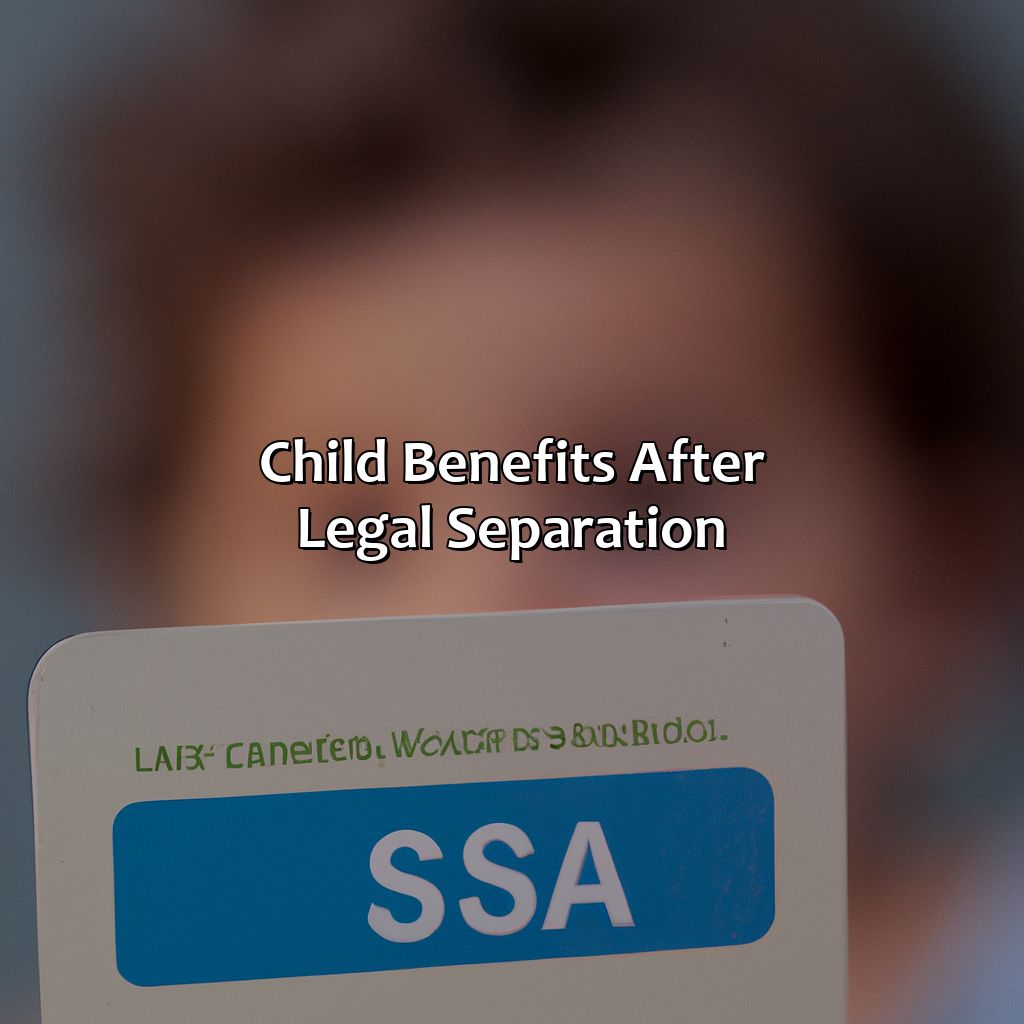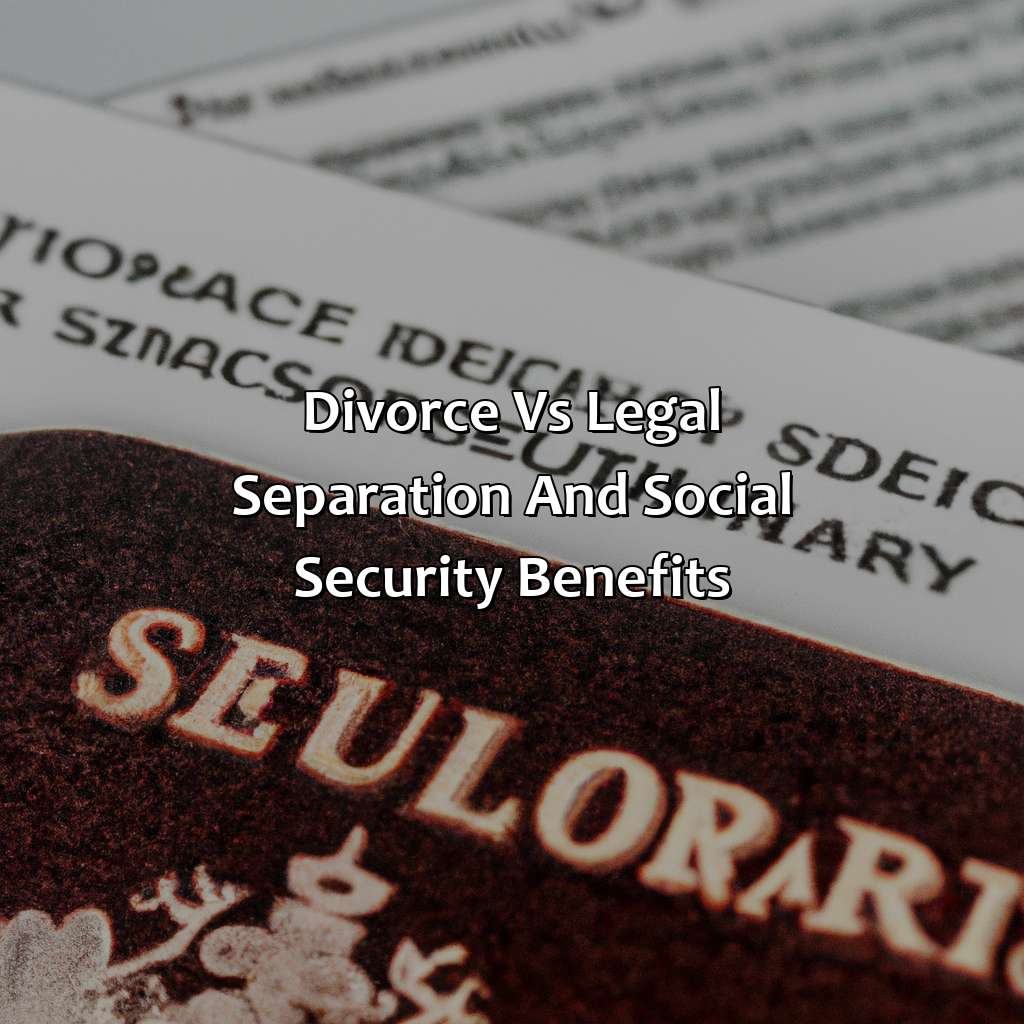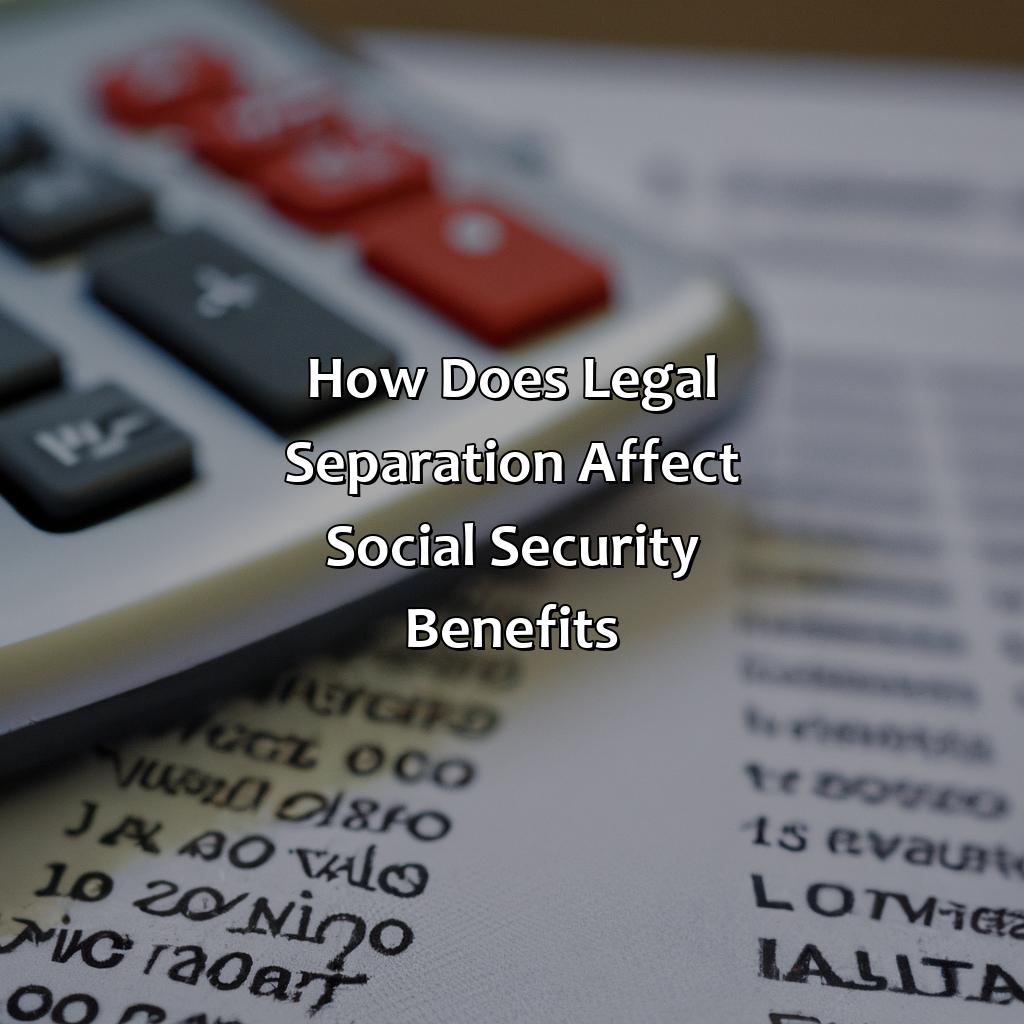How Does Legal Separation Affect Social Security Benefits?
Key Takeaway:
- Legal separation can affect social security benefits eligibility: In some cases, legal separation can affect a person’s eligibility for social security benefits. The length of the marriage and the duration of the legal separation can impact eligibility for spousal or survivor benefits.
- Spousal benefits may still be available after legal separation: Even if a couple is legally separated, one spouse may still be eligible for spousal benefits based on the other spouse’s earnings record. However, certain criteria must be met, such as being married for at least 10 years and the applicant being at least 62 years old.
- Child benefits may still be available after legal separation: In some cases, children of a legally separated couple may still be eligible for social security benefits. This can depend on the custody arrangement and other factors, such as the child’s age and disability status.
Are you unsure of the implications of getting legally separated? Learn how legal separation can affect your social security benefits so that you can make a more informed decision. You need to understand the rules and regulations around social security for separated spouses.
Social Security Benefits Overview
Social Security Benefits are an important source of income for millions of Americans. These benefits are provided to individuals who have worked and paid into the Social Security system. Legal separation can have an impact on Social Security benefits. When a couple is legally separated, they are still considered married for purposes of Social Security benefits. However, if one spouse is receiving Social Security benefits based on the other spouse’s work record, the legal separation may affect their eligibility for these benefits. It is important to consult with a Social Security expert to understand how legal separation may affect your benefits.
In the context of Social Security Benefits, legal separation can have an impact on spousal and survivor benefits. If a couple is legally separated, but not divorced, the non-working spouse may still be entitled to spousal benefits based on their ex-spouse’s work record. However, they must meet certain requirements, including being married for at least 10 years, not remarried, and the ex-spouse must be eligible for benefits. Survivor benefits may also be affected by legal separation. If a spouse passes away while they are legally separated, the surviving spouse may still be entitled to survivor benefits, but they must meet certain qualifications.
It is important to note that legal separation does not affect your own Social Security benefits. If you are eligible for benefits based on your work record, you will still receive those benefits even if you are legally separated from your spouse.
Pro Tip: It is important to speak with a Social Security expert to understand how legal separation may affect your benefits. They can help you navigate the complex rules and regulations to ensure that you receive all the benefits that you are entitled to.

Image credits: retiregenz.com by James Arnold
Legal Separation and Social Security Benefits
Understand legal separation’s effect on social security? Get a guide! It’s key to know the nitty-gritty of eligibility for those benefits. Moreover, explore spousal benefits post-legal separation – it’ll give great insights into this unusual situation.

Image credits: retiregenz.com by Yuval Arnold
Eligibility for Social Security Benefits after Legal Separation
After legally separating, one may still be eligible to receive Social Security benefits based on their former spouse’s work record. The marriage must have lasted at least ten years, and the applicant must be at least 62 years old and unmarried. The former spouse must also be eligible to receive benefits. It’s essential to note that legal separation does not qualify for spousal benefits; only divorced spouses are eligible.
Additionally, it’s crucial to know that if you remarry, you won’t be entitled to your former spouse’s Social Security benefits unless your subsequent marriage ends. Suppose your ex-spouse dies before you; in that case, you may still be able to claim survivor’s benefits if they’re not more than what you would’ve received based on your own earnings record.
Pro Tip: Understanding social security eligibility requirements can help determine how legal separation affects spousal or survivor benefits. It’s advisable to seek professional legal advice when considering a divorce or legal separation.
Just because you’re legally separated doesn’t mean your ex can’t still benefit from you – especially when it comes to spousal benefits.
Spousal Benefits After Legal Separation
Legal separation can affect spousal benefits in terms of eligibility and amount. Once legally separated, spousal benefits based on the ex-partner’s work record are only possible if the qualifying requirements are met. In addition, if the spouse is currently collecting social security benefits on their own work record, they may not be eligible for spousal benefits at all.
It is vital to note that legal separation is not equivalent to divorce, hence having spousal rights depends entirely on your marital status. Suppose two spouses have been living apart for at least two years, one spouse has reached full retirement age and can collect Social Security based on their own record. In that case, it may be beneficial to file and suspend their application rather than claiming them immediately.
One such instance occurred when a client reported married for 7 years before getting legally separated. The spouse approached us as ex-partner was all set to retire and they wanted to know if they were entitled to any part of their benefit amount based on his work history. After a thorough evaluation of their situation, we were able to highlight the risks and provide insight into how much the wife would potentially receive by claiming her own Social Security rather than half of her ex-partner’s benefit amounts.
Who knew getting separated could be so lucrative? Child benefits are just another way to cash in on your broken heart.
Child Benefits After Legal Separation
Figuring out if your kid is eligible for social security benefits after legal separation is not easy. To help you, we’ve created this section titled ‘Child Benefits After Legal Separation‘. It has two subsections:
- Eligibility for Child Benefits After Legal Separation
- Impact of Custody Arrangements on Child Benefits
These will give you the info you need to know about qualifying for benefits and how custody affects them.

Image credits: retiregenz.com by Yuval Washington
Eligibility for Child Benefits After Legal Separation
Legal Separation and Eligibility for Child Social Security Benefits
After a legal separation, parents may wonder about their eligibility for child social security benefits. In many cases, the custodial parent can receive benefits on behalf of their child if they meet certain eligibility criteria. These benefits may provide crucial financial support for families during times of change.
To qualify for these benefits, the child must be under 18 or have a disability that began before they turned 22. Additionally, the noncustodial parent must have a work history that qualifies them for social security benefits themselves. The child’s benefit amount is generally based on the earnings record of the noncustodial parent.
It’s important to note that legal separation does not affect a child’s eligibility for social security benefits. However, it may impact how those benefits are distributed between parents if there are disagreements over custody or support agreements.
Don’t miss out on potential financial relief by neglecting to apply for your child’s social security benefits after a legal separation. Understanding the requirements and the process can ensure you receive all eligible payments to support your family during this difficult time.
When it comes to custody battles, the only thing that’s certain is that child benefits will be split faster than a Kit-Kat bar.
Impact of Custody Arrangements on Child Benefits
Child benefits are profoundly impacted by custody arrangements following legal separation. The nature of custody determines which parent is entitled to receive the payments. If one parent has full custody, they will receive the benefits, but if there is shared or joint custody, both parents may receive a share of the payments. This division depends on specific factors such as income levels and time spent with the child.
Legal separation affects child benefit eligibility and can result in a decrease in payment amounts once shared residency status has changed. In cases of joint or shared living arrangements, multiple claims from each parent may lead to a reduction in overall benefit amounts for families who previously received higher payouts under single-residency structures.
There is a need to promptly update any information regarding social security agreements made upon separation. It is essential that parents notify relevant authorities about care arrangements made following their split so that policies align accordingly.
According to Family Law Manual’s 2019 guidelines: “If both parties claim child benefits without an agreement between themselves, HM Revenue & Customs shall choose which one it pays.” Therefore, clear communication and prompt documentation can prevent conflicts on payout claims and benefit disbursement.
Divorce may break up a marriage, but legal separation just puts it on hiatus – and so do your social security benefits.
Divorce vs. Legal Separation and Social Security Benefits
Legal Separation vs. Divorce and their Impact on Social Security Benefits
Social Security benefits are significant financial support for many Americans. Spouses’ eligibility for Social Security benefits can be affected by legal separation or divorce.
- Legal Separation: Legal separation allows married couples to live apart while still being legally married. It does not affect spouses’ eligibility for Social Security benefits based on each other’s work records or survivor benefits if they meet the eligibility criteria.
- Divorce: After divorce, spouses may be eligible for Social Security benefits based on their ex-spouses’ work history if they meet certain requirements. If divorced spouses have not been married for ten years or more, they are not eligible for Social Security benefits based on their ex-spouses’ work records.
- Spousal Benefits: Spouses may be eligible for Social Security benefits based on their working spouse’s record or their ex-spouse’s record if they are divorced. To qualify for spousal benefits, the spouses must meet certain age, marriage duration, and other eligibility requirements.
- Survivor Benefits: If one spouse dies, the surviving spouse may be eligible for Social Security benefits based on their deceased spouse’s work records. For divorced spouses to qualify, they must have been married for ten or more years and meet other criteria.
- Remarriage: If the divorced or separated spouse remarries, they lose eligibility for Social Security benefits based on their former spouse’s work record unless specific conditions are met.
- Earnings Limitations: Those who receive Social Security benefits and continue to work have specific earnings limitations in place that may decrease their benefits if they surpass a certain earnings level.
While divorce and legal separation can affect Social Security benefits, it is essential to understand the Social Security Administration’s requirements for eligibility carefully. Eligibility factors like marriage duration, remarriage, or earnings limitations can influence benefit amounts. Such factors should be carefully considered before making any decisions.
Mary and John had been married for 23 years before John filed for legal separation. Mary was eligible for Social Security benefits based on John’s work record. However, after legal separation, Mary’s eligibility for these benefits was not affected because they remained legally married. John had to work for ten or more years after legal separation to maintain eligibility for Social Security benefits for Mary based on his record, which he was aware of before filing for legal separation.

Image credits: retiregenz.com by Adam Duncun
Five Facts About How Does Legal Separation Affect Social Security Benefits:
Legal separation does not affect social security benefits for married couples who are still legally married. (Source: Social Security Administration)
If a legally separated person has their own work record, that record is used to determine social security benefits. (Source: AARP)
If a legally separated person does not have their own work record, they may be eligible to claim social security benefits based on their ex-spouse’s work record. (Source: Social Security Administration)
To receive social security benefits based on an ex-spouse’s work record, the marriage must have lasted at least ten years. (Source: AARP)
Legal separation may affect eligibility for other public benefits, such as Medicaid and Supplemental Security Income. (Source: LegalZoom)
FAQs about How Does Legal Separation Affect Social Security Benefits?
How does legal separation affect social security benefits?
Legal separation can affect social security benefits in different ways depending on individual circumstances. Generally, if a couple has been married for at least 10 years, and one spouse has little or no income, he or she may be entitled to a portion of the other spouse’s social security benefits even after a legal separation.
What happens to my social security benefits if my spouse and I are legally separated?
If you are legally separated, you may still be eligible for spousal benefits if you meet the eligibility requirements. However, if you remarry, you will no longer be eligible for spousal benefits from your previous spouse, unless that marriage ends in divorce or annulment.
Can I still receive social security benefits if I am legally separated from my spouse?
Yes, you can still receive social security benefits if you are legally separated from your spouse. However, your benefits may be affected if you receive spousal benefits based on your spouse’s work record.
Can I receive social security benefits from my ex-spouse if we are legally separated?
Yes, if you were married for at least 10 years, and meet other eligibility requirements, you may receive social security benefits based on your ex-spouse’s work record, even if you are legally separated.
What happens to my social security benefits if I remarry after a legal separation?
If you remarry after a legal separation, you may still be eligible for benefits from your former spouse’s work record, but only if your subsequent marriage ends in divorce or annulment.
Do I need to notify Social Security if I am legally separated from my spouse?
It is not necessary to notify Social Security if you are legally separated from your spouse. However, if you are receiving benefits based on your spouse’s work record, you should contact Social Security to notify them of the legal separation as it may affect the amount of your benefits.
 Checkout this IRS Loophole
Checkout this IRS Loophole 
